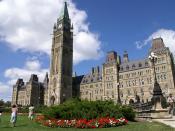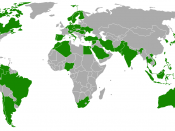Middle powers are said to be those states occupying the middle point in a range of bigness to smallness- usually measured by quantifiable attributes as area, population, size, complexity and strength of economy, military capability, and other comparable factors (Cooper, 1993).
Canada is a middle power, as defined by the preceding quotation, but to a greater extent as well. But it wasn't always this way. After World War I, Canada adopted an autonomous, quite isolationist stance characterized by a refusal to engage in collective decision-making and an avoidance of all commitments, possibly fearing another European war. All that changed, however, in the aftermath of the World War that followed.
With the dramatic shift in economic and political systems the alignments, institutions, and the understandings that came with the aftermath of W.W.II withering away, or collapsing, or being dismantled (Cooper, 1993), the Canadian Government sought to reorganize their bureaucracies for the conduct of a more economically oriented foreign policy.
Truth be told Canada's wasn't entirely isolationist before, in fact it had almost always been an open economy dependent on international resource markets (McBride, 2003). Canada was in fact one of the first globalized nations, and Canadian political economists were among the first to seek to understand the impact of global relations on domestic economic and political development. Canada was resource and export dependent and many believed that the lack of economic self-sufficiency drove Canada's need for new national strategies, or polices (McBride, 2003). Derived undoubtedly from Canada's marginal semi-peripheral position within the international political economy (Gordon, 1966).
So after W.W II, Canada's new national polices all sought to facilitate economic development in the context of a relatively trade dependent economy integrated into world markets (Dymond, 2003). That is, these polices spoke to international questions, such as trade and foreign investment. And...


